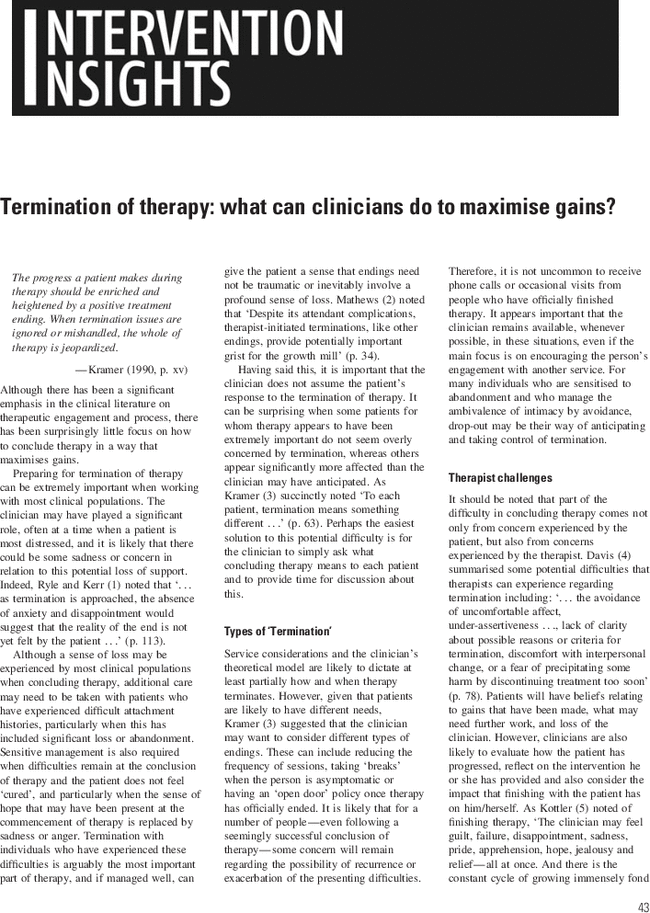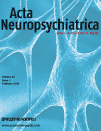Termination of therapy: what can clinicians do to maximise gains?
Corresponding Author
Craig A. Macneil
Early Psychosis Prevention and Intervention Centre (EPPIC) and ORYGEN Research Centre, 35 Poplar Road, Parkville, Melbourne, Victoria 3052, Australia
Dr Craig A. Macneil, ORYGEN Youth Health, Melbourne, Australia.Tel: +61 3 9342 2800;Fax: +61 3 9387 3003;E-mail: [email protected]Search for more papers by this authorMelissa K. Hasty
Early Psychosis Prevention and Intervention Centre (EPPIC) and ORYGEN Research Centre, 35 Poplar Road, Parkville, Melbourne, Victoria 3052, Australia
Search for more papers by this authorPhilippe Conus
Early Psychosis Prevention and Intervention Centre (EPPIC) and ORYGEN Research Centre, 35 Poplar Road, Parkville, Melbourne, Victoria 3052, Australia
Treatment and Early Intervention in Psychosis Program (TIPP), Département de Psychiatrie CHUV, Université de Lausanne, Clinique de Cery, 1008 Prilly, Switzerland
Search for more papers by this authorMichael Berk
Early Psychosis Prevention and Intervention Centre (EPPIC) and ORYGEN Research Centre, 35 Poplar Road, Parkville, Melbourne, Victoria 3052, Australia
Department of Clinical and Biomedical Sciences—Barwon Health, University of Melbourne, Geelong, Australia
Mental Health Research Institute, Melbourne, Australia
Search for more papers by this authorCorresponding Author
Craig A. Macneil
Early Psychosis Prevention and Intervention Centre (EPPIC) and ORYGEN Research Centre, 35 Poplar Road, Parkville, Melbourne, Victoria 3052, Australia
Dr Craig A. Macneil, ORYGEN Youth Health, Melbourne, Australia.Tel: +61 3 9342 2800;Fax: +61 3 9387 3003;E-mail: [email protected]Search for more papers by this authorMelissa K. Hasty
Early Psychosis Prevention and Intervention Centre (EPPIC) and ORYGEN Research Centre, 35 Poplar Road, Parkville, Melbourne, Victoria 3052, Australia
Search for more papers by this authorPhilippe Conus
Early Psychosis Prevention and Intervention Centre (EPPIC) and ORYGEN Research Centre, 35 Poplar Road, Parkville, Melbourne, Victoria 3052, Australia
Treatment and Early Intervention in Psychosis Program (TIPP), Département de Psychiatrie CHUV, Université de Lausanne, Clinique de Cery, 1008 Prilly, Switzerland
Search for more papers by this authorMichael Berk
Early Psychosis Prevention and Intervention Centre (EPPIC) and ORYGEN Research Centre, 35 Poplar Road, Parkville, Melbourne, Victoria 3052, Australia
Department of Clinical and Biomedical Sciences—Barwon Health, University of Melbourne, Geelong, Australia
Mental Health Research Institute, Melbourne, Australia
Search for more papers by this author
References
- 1
Ryle A,
Kerr I.
Introducing cognitive analytic therapy: principles and practice. West Sussex: John Wiley & Sons, Ltd., 2002.
10.1002/9780470713587 Google Scholar
- 2 Mathews B. Terminating therapy: implications for the private practitioner. Psychother Priv Pract 1989; 7: 29–39.
- 3 Kramer SA. Positive endings in psychotherapy: bringing meaningful closure to therapeutic relationships. San Francisco, CA: Jossey-Bass Publishers, 1990.
- 4 Davis DD. Terminating therapy. A professionals guide to ending on a positive note. Hoboken, NJ: John Wiley & Sons, Inc., 2008.
- 5 Kottler JA. On being a therapist, 3rd edn. San Francisco, CA: Jossey-Bass Publishers, 2003.
- 6 Hillman J. The myth of analysis: three essays in archetypal psychology. IL: Northwestern University Press, 1998.
- 7 Henry L, Edwards J, Jackson H, Hulbert C, McGorry, P. Cognitively Oriented Psychotherapy for First-Episode Psychosis (COPE). Victoria: EPPIC, 2002.
- 8 O'Connell B. Solution-focused therapy. London: Sage Publications, 2005.
- 9 Freedman J, Combs G. Narrative therapy: the social construction of preferred realities. New York: Norton, 1996.
- 10 O'Keefe P, Berk M. Writing letters to patients. Acta Neuropsychiatr 2009; 21: 314–316.




